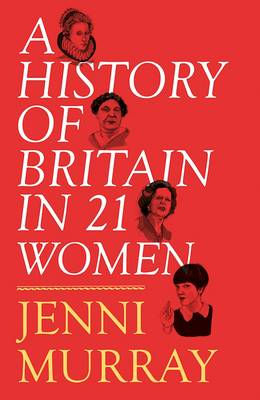'The History of Britain in 21 Women' by Jenni Murray
- audreylinton

- Mar 9, 2020
- 2 min read
Journalist and broadcaster Jenni Murray in her book The History of Britain in 21 Women takes us back through time and recounts her top 21 women in British history. From Boudicca, Elizabeth I, Jane Austen, to Margaret Thatcher, Murray explains the impact these women have had in British history, as well as how they fought against a world which is dominated by men.

I picked up this book hoping to learn more about female presence in history, and that is exactly what happened. Even as a former History student, I was almost shocked at the number of names I did not recognise or know of their story. I think that is what makes this book so successful – Murray finds a good balance between big names in British history, notably Jane Austen and Emmaline Pankhurst, with women who have often been overlooked or overshadowed by others.
Murray goes in chronological order through history and explains why each figure is so important to our past. She makes it clear that this is merely her personal choice, but sets out convincing arguments for each. Each woman combats something used against her gender, whether it was becoming a female monarch, fighting for the right to marry for love and not wealth, the fight for female enfranchisement, or fighting in a sphere which completely rejected women.
Some names that were included made me a tad bit sceptical, such as Margaret Thatcher, who isn’t typically remembered as a feminist icon. Yet Murray explains how she persevered in an industry which was so male-dominated that she earned her position in this book. Whilst I might not agree with everything Murray sets out, it can’t be denied that Thatcher is a well-known female name in British history (but maybe not for all the right reasons….)
Not only did I learn more about individuals who shaped the past, but I also learnt a great deal about gender history as a whole. I was utterly shocked when I read that women were not defined in law as a person until 1929 (!!), or that even in 2016, fewer women were leading FTSE firms than men called John. It just goes to show that whilst women have come a long way, we still have a hell of a lot longer to go.
The book is full of interesting and inspiring feminist quotes, and shed light on just how brave these women were, defying all odds. I really enjoyed the book, and, as I said, whilst I might not agree 100% with everything that Murray argued, it opens up an interesting debate for who I would consider the most remarkable 21 women in the history of Britain. And as this book shows, there are a lot more figures than anyone would have considered.
If you want to learn more about the history of Britain, or simply want a good feminist book, then I’d certainly recommend this one.
Favourite quotes:
(This was actually quite hard considering each woman had some amazing points about their gender.)
“I know I have the body but of a weak and feeble woman, but I have the heart and stomach of a king and of a king of England too.” Elizabeth I
“Who made the laws by which you judge me? Men!” The Rover
“Anything is to be preferred or endured rather than marrying without affection.” Jane Austen



Comments